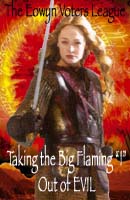April 18, 2005
And you thought OUR elections were bad...
An article from BBC News today discusses a minor blow to Tony Blair's bid for re-election. Seems one Derek Cattell, a member of the Labour party's executive board in Sedgefield, which is Mr. Blair's home constituency, has resigned from the Labour party in protest ove the war in Iraq (now??? why not 2 years ago??-ed.) Mr. Cattell has announced that he is now supporting Reg Keys, the father of an Iraq casualty, who is running independently for Mr Blair's seat. An explanation of why Mr. Blair must run again is below the fold...
But what's rather funny about all of this are the names and party affiliations of some of the other candidates up against Mr. Blair:
Jonathan Cockburn, Blair Must Go Party
Fiona Luckhurst-Matthews, Veritas
Baroney Maroney Staniforth, Monster Raving Loony Party
Heh. The joys of a multi-party system.
More Brit election analysis as we get closer to the big day (May 5), I just had to share my amusement at the candidate list...
Kudos to the Beeb (who rarely ever get my praise) for a wonderfully comprehensive webpage listing all of the issues and all of the party platforms (or manifestos as they call them in th UK) here and especially here.
Read More "And you thought OUR elections were bad..." »April 21, 2005
Blogging impacts British Election, too
In today's electon coverage, the BBC features a story on the impact of blogging on the political scene in the UK, and how the "democratization" of the media is changing business as usual for Britain's political parties.
Video features gratuitous shots of Karl Rove talking on his cell phone and a snippet of an interview with former Tory leader Ian Duncan Smith, discussing his article on blogging (which I covered here).
More on the British elections later.... A piece on the non-issue in this year's election...
April 26, 2005
A Model of Victorian Domesticity, Part I
This is the first in a multi-part series about the issues in the British elections, for those of you who are interested in the issues and outcomes...
The British election follows many of the same patterns we're used to here in the US. Sniping, oneupsmanship, and disagreements on any number of issues. Like the elections we held last fall, Britain's general elections are also thought to be an unofficial referendum on the Iraq war. At least the Tories hope so.
Beyond Iraq, the main issue is Britain's faltering National Healthcare System (NHS), which has been plagued for many years by inadequate staffing and resources, costs exceeding receipts (from government) and long wait times for diagnosis and treatment. Things that are absolutely unthinkable in the US, at least, if you have health insurance. Each side has a different plan to solve the problem. Labour wants to continue to pour money into the system, to improve infrastructure and allow patients more choice with less wait time. The Tories want to scale back NHS in favor of a growing private medical sector, and give patients incentives to choose private doctors over NHS if they have personal health insurance. Think of it as a kind of school voucher program for hospitals. Neither is a great plan, honestly, but perhaps I feel that way because I am absolutely appalled by some of the conditions that British citizens put up with today in the NHS.
-Wait times for cancer patients to receive treatment from an oncologist vary from 2 weeks to 14 weeks.
--patients can wait 6 months to get an appointment with an NHS dentist
--under the current system (somethign labour is trying to change) patients must see a nearby doctor even if the wait time to see a doctor in a neighboring district is less (sometimes by several weeks)
Obviously the system must change. And you were wondering why we didn't hear much from the Universal Health Care moonbats in the last election? Well, it's not just that they were too busy war protesting, they were afraid we'd bring up the sad state of health care in the UK. Sure, countries like Sweden have thriving, useful, state-provided healthcare systems, but Britain's is on its last legs.
May 05, 2005
Like you give a crap...
But if you care about the British elections, live coverage from the BBC just started on C-SPAN 2. Or you can watch it here
July 07, 2005
F*ckers
Why can't you just go about your business, huh? Were any of these people PERSONALLY harming you? I didn't think so.
I hope you all fry for this.
Frankly, I'm surprised it was an islamic group. I would have thought it would be crazy eco-terrorists, seeing as they've been more forward in the UK and it is tied to the G8 meeting....
Go get 'em Tony!
October 28, 2005
Tony Blair sums it up
This is why I love Tony Blair:
In response to a question about the explosive declaration by Mahmoud Ahmadinejad regarding Israel being "wiped off the map", Mr. Blair had this to say,"If they carry on like this the question people will be asking us is — when are you going to do something about Iran? Can you imagine a State like that with an attitude like that having nuclear weapons?”
Yes! That's exactly it, Tony. Tell people exactly what they're about to think, and make them believe it.
Then let's go after the bastards.
More here, and the inimitable take of the Jawas should also not be missed.
The issue of Iran is quite a thorny one, many people believe that were it not for the Mullahs Iran might be the most pro-democracy and pro-US county in the middle east region due to the large number of US educated adults who make up the upper and middle classes of Iran from the days before the Ayatollah. This is one of the reasons the US hasn't been as hard on Iran as on some of her neighbors. Clearly Ahmadinejad just made himself and his country more of a target.
Cowards seem to have a hard time learning that whole "Let sleeping dogs lie" analogy.
December 11, 2006
I love Tony Blair...
... and I always have. I will miss him when he steps down.
I wish some people in this country could be this direct and honest:
Here's the MONEY QUOTE, though:"People want to make sense of two emotions: our recognition of what we legitimately hold in common and what we legitimately hold distinct. When I decided to make this speech about multiculturalism and integration, some people entirely reasonably said that integration or lack of it was not the problem. The 7/7 bombers were integrated at one level in terms of lifestyle and work. Others in many communities live lives very much separate and set in their own community and own culture, but are no threat to anyone.
But this is, in truth, not what I mean when I talk of integration. Integration, in this context, is not about culture or lifestyle. It is about values. It is about integrating at the point of shared, common unifying British values. It isn't about what defines us as people, but as citizens, the rights and duties that go with being a member of our society.
Christians, Jews, Muslims, Hindus, Sikhs and other faiths have a perfect right to their own identity and religion, to practice their faith and to conform to their culture. This is what multicultural, multi-faith Britain is about. That is what is legitimately distinctive.
But when it comes to our essential values - belief in democracy, the rule of law, tolerance, equal treatment for all, respect for this country and its shared heritage - then that is where we come together, it is what we hold in common; it is what gives us the right to call ourselves British. At that point no distinctive culture or religion supercedes our duty to be part of an integrated United Kingdom.
...
We must respect both our right to differ and the duty to express any difference in a way fully consistent with the values that bind us together.
So: how do we do this?
Partly we achieve it by talking openly about the problem. The very act of exploring its nature, debating and discussing it doesn't just get people thinking about the type of Britain we want for today's world; but it also eases the anxiety. It dispels any notion that it is forbidden territory. Failure to talk about it is not politically correct; it's just stupid.
Partly the answer lies in precisely defining our common values and making it clear that we expect all our citizens to conform to them. Obedience to the rule of law, to democratic decision-making about who governs us, to freedom from violence and discrimination are not optional for British citizens. They are what being British is about. Being British carries rights. It also carries duties. And those duties take clear precedence over any cultural or religious practice.
Our tolerance is part of what makes Britain, Britain. So conform to it; or don't come here. We don't want the hate-mongers, whatever their race, religion or creed. If you come here lawfully, we welcome you. If you are permitted to stay here permanently, you become an equal member of our community and become one of us. Then you, and all of us, who want to, can worship God in our own way, take pride in our different cultures after our own fashion, respect our distinctive histories according to our own traditions; but do so within a shared space of shared values in which we take no less pride and show no less respect.
The right to be different. The duty to integrate. That is what being British means. And neither racists nor extremists should be allowed to destroy it.
h/t Cop The Truth
July 02, 2007
You heard it here first...
Given all of the chatter going 'round about the UK bombings, and how this hearkens back to the heyday of the IRA and all that, I can't help but wonder two things:
1. Did these bomb plotters actually hire former IRA bombmakers to teach them what to do?
and
2. Did those IRA bombmakers intentionally fuck them over so they wouldn't hurt anyone and would get caught?
I mean, the IRA hates the UK, but it's their island. Letting muslim terrorists blow it up kind of negates their point, right?
Tony Blair lets his guard down
And finally has a chance to speak his mind after 10 years as Prime Minister:
'The idea that as a Muslim in this country that you don't have the freedom to express your religion or your views, I mean you've got far more freedom in this country than you do in most Muslim countries,' Blair told Observer columnist Will Hutton, who presents the documentary.Honestly, I have been waiting for this since Tony and Cherie walked out of 10 Downing Street. You know there has to be a LOT boiling beneath that calm exterior.'The reason we are finding it hard to win this battle is that we're not actually fighting it properly. We're not actually standing up to these people and saying, "It's not just your methods that are wrong, your ideas are absurd. Nobody is oppressing you. Your sense of grievance isn't justified."'
Blair held out the example of the overthrow of the Taliban in Afghanistan - criticised by Islamists as an example of the heavy-handed imperial West oppressing Muslims - to highlight unfounded claims of grievance. He asked how it is possible to claim that Afghanistan's Muslims are being oppressed when the Taliban 'used to execute teachers for teaching girls in schools'.
Blair added: 'How are [we] oppressing them? You're oppressing them when you support the people who are trying to blow them up.'
Blair, who normally chooses his language carefully when he talks about Islamists, also takes a swipe at critics who accused him of undermining civil liberties. 'When I'm trying to change the law in order to make it easier to deport people who engage in terrorism - the idea that that's an assault on hundreds of years of British civil liberties is completely absurd. Some of what is written on this is loopy-loo in its extremism.'
I look forward to more of what Tony has to say. Glad to hear he's not going quietly into his next assignment as mideast envoy.
h/t Martin at MVRWC
July 03, 2007
Tony Blair -- Realist
Tony Blair is interviewed by the BBC about his response to terrorism and whether or not new anti-terrorist laws enacted under his leadership limit British civil liberties:
The money quotes start at about 1:30 left. And yes, this is the video of the interview that yielded the quotes discussed here.













